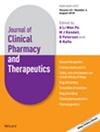Upadacitinib Is a Better Choice than Abrocitinib for Patients with Moderate-to-Severe Atopic Dermatitis: An Updated Meta-Analysis
IF 2.1
4区 医学
Q3 PHARMACOLOGY & PHARMACY
引用次数: 0
Abstract
Background. Blocking agent for immune cytokine pathways is a novel treatment for atopic dermatitis (AD). Janus kinase (JAK) family is one of the cytoplasmic tyrosine kinases that mediate a variety of cytokines. Eight randomized controlled trials (RCTs) of JAK1 inhibitors (upadacitinib and abrocitinib) in AD have been published in the past three years. Objective. To evaluate the efficacy and safety of JAK1 inhibitors and compare upadacitinib with abrocitinib for the treatment of moderate-to-severe AD. Methods. Two independent reviewers searched Medline, Embase, Web of Science, and Cochrane databases updated on Apr 11th, 2023. We included data from phase two and three RCTs. Primary outcomes included the proportion of Investigator’s Global Assessment (IGA) responders and Eczema Area and Severity Index-75 (EASI-75) responders. Results. In all, eight RCTs were included in our study with 4634 moderate-to-severe AD patients. Both JAK1 inhibitors showed apparent therapeutic effects, but the 200 mg abrocitinib group demonstrated less efficacy than the 30 mg upadacitinib group in IGA responders (end of treatment) and EASI-75 responders (after 2 weeks of treatment). However, both JAK1 inhibitor groups demonstrated significantly higher risks of acne (9.0%) and headache (6.3%). Besides, upadacitinib showed significantly higher risks of upper respiratory tract infection (7.6%) and nasopharyngitis (9.7%), and abrocitinib showed significantly higher risks of nausea (9.6%). Conclusion. JAK1 inhibitors demonstrate promising efficacy in AD with rapid response and dose-dependent response and significantly higher risks of acne and headache. Based on existing data, oral 30 mg upadacitinib QD has better outcome than oral 200 mg abrocitinib QD and is a recommended dosage regimen for moderate-to-severe AD patients. Oral 15 mg upadacitinib QD might be an alternative dosage regimen in case of treatment-emergent adverse events.对中重度特应性皮炎患者来说,乌帕达西替尼是比阿布罗替尼更好的选择:一项最新的荟萃分析
背景。免疫细胞因子通路阻断剂是治疗特应性皮炎(AD)的一种新方法。Janus激酶(JAK)家族是介导多种细胞因子的细胞质酪氨酸激酶之一。在过去的三年中,已经发表了8项JAK1抑制剂(upadacitinib和abrocitinib)治疗AD的随机对照试验(RCTs)。目标。评估JAK1抑制剂的有效性和安全性,并比较upadacitinib与abrocitinib治疗中重度AD的疗效。方法。两名独立审稿人检索了Medline、Embase、Web of Science和Cochrane数据库,更新日期为2023年4月11日。我们纳入了二期和三期随机对照试验的数据。主要结局包括研究者总体评估(IGA)应答者和湿疹面积和严重程度指数-75 (EASI-75)应答者的比例。结果。我们的研究共纳入8项随机对照试验,共纳入4634例中重度AD患者。两种JAK1抑制剂均显示出明显的治疗效果,但在IGA应答者(治疗结束)和EASI-75应答者(治疗2周后)中,200 mg阿布替尼组的疗效低于30 mg upadacitinib组。然而,JAK1抑制剂组的痤疮(9.0%)和头痛(6.3%)的风险明显更高。upadacitinib出现上呼吸道感染(7.6%)和鼻咽炎(9.7%)的风险显著高于upadacitinib,出现恶心(9.6%)的风险显著高于abrocitinib。结论。JAK1抑制剂在AD中表现出良好的疗效,具有快速反应和剂量依赖性,并且痤疮和头痛的风险显着增加。根据现有数据,口服30 mg upadacitinib QD优于口服200 mg abrocitinib QD,是中重度AD患者的推荐给药方案。口服15mg upadacitinib QD可能是治疗出现不良事件的替代剂量方案。
本文章由计算机程序翻译,如有差异,请以英文原文为准。
求助全文
约1分钟内获得全文
求助全文
来源期刊
CiteScore
4.10
自引率
5.00%
发文量
226
审稿时长
6 months
期刊介绍:
The Journal of Clinical Pharmacy and Therapeutics provides a forum for clinicians, pharmacists and pharmacologists to explore and report on issues of common interest. Reports and commentaries on current issues in medical and pharmaceutical practice are encouraged. Papers on evidence-based clinical practice and multidisciplinary collaborative work are particularly welcome. Regular sections in the journal include: editorials, commentaries, reviews (including systematic overviews and meta-analyses), original research and reports, and book reviews. Its scope embraces all aspects of clinical drug development and therapeutics, including:
Rational therapeutics
Evidence-based practice
Safety, cost-effectiveness and clinical efficacy of drugs
Drug interactions
Clinical impact of drug formulations
Pharmacogenetics
Personalised, stratified and translational medicine
Clinical pharmacokinetics.

 求助内容:
求助内容: 应助结果提醒方式:
应助结果提醒方式:


